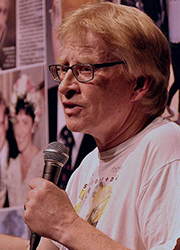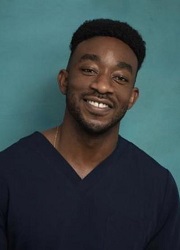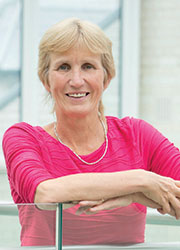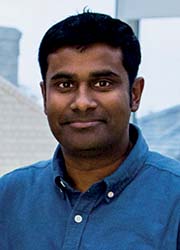

In the media spotlight
Working as a volunteer has opened up very different worlds for Hareen De Silva

In the middle of the South Atlantic Ocean is Gough Island, a remote and uninhabited 35 square mile stretch of volcanic land. For the last six months of 2021, this was home for portfolio GP Dr Hareen De Silva, who was working as a team medic on an expedition organised by the Royal Society for the Protection of Birds.
It was a peaceful contrast to other locations where Hareen – former Chair of the College's South Yorkshire and North Trent Faculty – has worked in his career to date. Over the past two years he has been delivering vital medical aid to refugees in Greece, Iraq, and Syria.
In November 2020, he volunteered to work at Kara Tepe 2, a refugee camp in Greece for six weeks.
“Outside our medical tent, daily queues of 500-600 people emerged, all waiting for a GP appointment, with some people sleeping in the line or joining the queue as early as 1am to try and get a consultation,” he said.
With a maximum of only 100 appointments available per day, a GP, nurse, and translator moved down the queue triaging patients, and deciding who needed to be seen that day, and, with no forward booking system for appointments, who would need to queue again the next.
Many of the patients had conditions caused by poor sanitation and overcrowding in the camp such as scabies, while others had poorly controlled long term health conditions including diabetes and high blood pressure. Access to and supply of medications was also limited.
But the most difficult challenge, says Hareen, was 'overcoming the sense of guilt and mental drain of telling patients that they'd need to wait longer for medical care when they'd already waited so long, sometimes so long they'd missed their allocated slot to shower or collect food.'
Two months later, he arrived in Syria after securing a job for a small non-governmental organisation CADUS and found himself working in what was still a very active conflict zone.
The key to working in this environment is, he says, 'firstly assessing if it is within the limits of your personal risk tolerance, and if it is, accepting that you can't control what's going on around you, then working to develop a strong sense of trust in the people you work with, particularly the security team.'
For four months, Hareen was responsible for updating and delivering clinical education to nurses and doctors working at the hospital, while also educating patients about hygiene, and manually monitoring and reporting diseases in the camp to the World Health Organization.
At the beginning of this year, Hareen returned to Iraq and Syria to work for CADUS as the Medical Coordinator for the Middle East, overseeing the medical aspects of CADUS projects in Iraq and Syria and helping to identify possible new projects.

In Syria he manages the field hospital including the staff and budget for equipment and pharmaceuticals, and in Iraq he helped create a pre-hospital care training programme for ambulance drivers.
Two weeks before his arrival at the CADUS office, ISIS had orchestrated an attack on the al-Sina prison, in the town where their office is located, breaking out ISIS prisoners leading to ‘fighting in the streets, suicide bombings, and people being killed.'
“It is my responsibility to protect the wellbeing of the doctors and nurses and keep up morale. There is nothing more disheartening for the medical team than being faced with a patient they can't treat. I've also had to make some tough calls on what we spend our limited budget on,” he explains.'
His contract at the Syrian hospital finishes in December 2022. After this, he's hoping to temporarily switch off and embark on another conservation expedition to Midway Island in the North Pacific Ocean.
“My experiences working with vulnerable populations has made me very grounded. I appreciate the ease of day-to-day life in the UK, such as having electricity to charge your phone, after living in Syria where electricity was only available for six hours a day.
“It’s also made me feel even more privileged to be a GP working in the NHS and grateful for easy access to an abundance of resources.”
Hareen encourages all GPs to get involved in volunteering, if possible.
Having also worked at a Nightingale Hospital during the pandemic, he says: “It doesn't have to be abroad or in some of the remotest locations in the world. You can have just as much impact volunteering in your local community.”
Read more
Thank you for your feedback. Your response will help improve this page.



